中考英语语法一点通课件——Lesson 7 四大时态
文档属性
| 名称 | 中考英语语法一点通课件——Lesson 7 四大时态 | 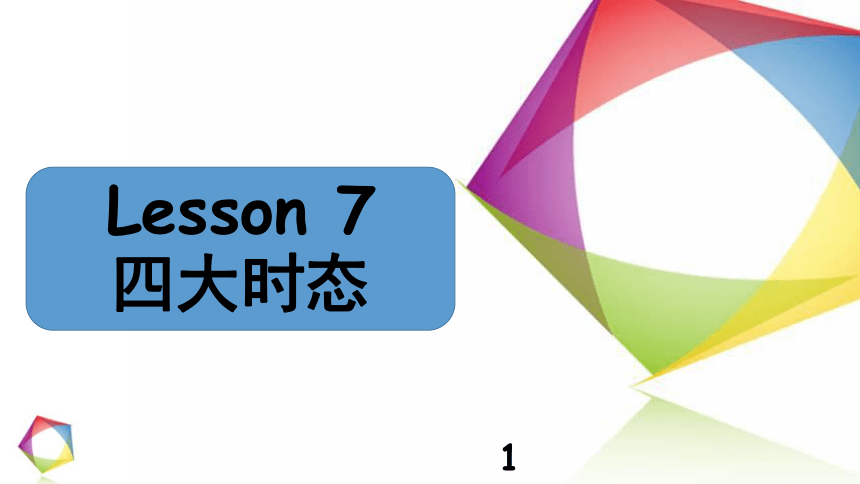 | |
| 格式 | pptx | ||
| 文件大小 | 326.1KB | ||
| 资源类型 | 试卷 | ||
| 版本资源 | 通用版 | ||
| 科目 | 英语 | ||
| 更新时间 | 2022-04-11 14:04:05 | ||
图片预览


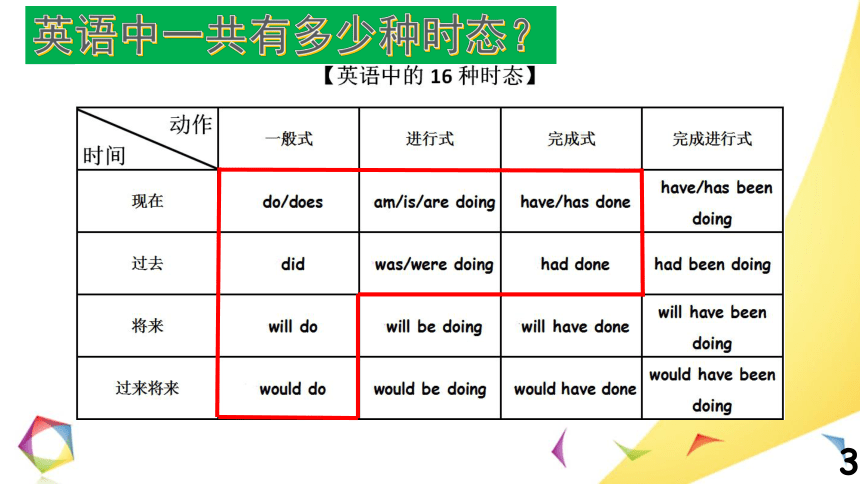
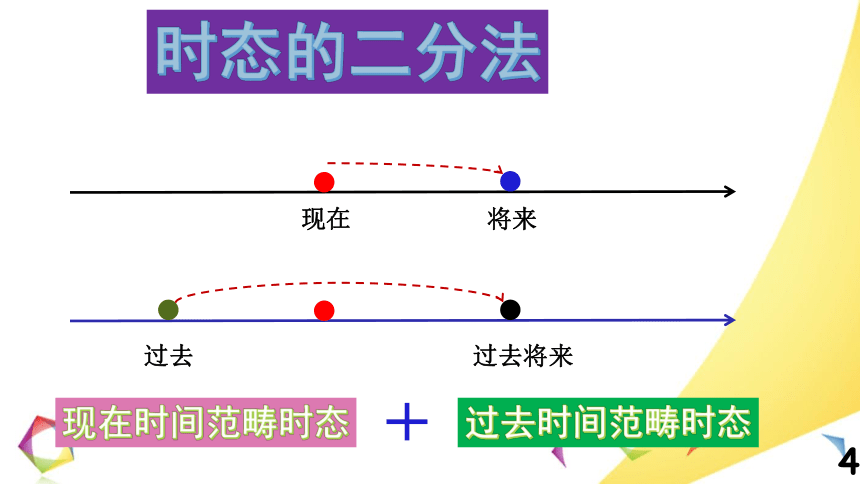
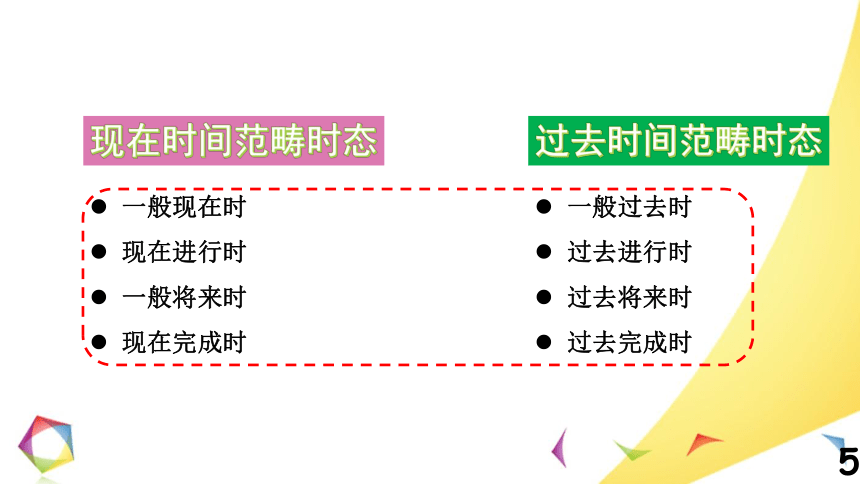
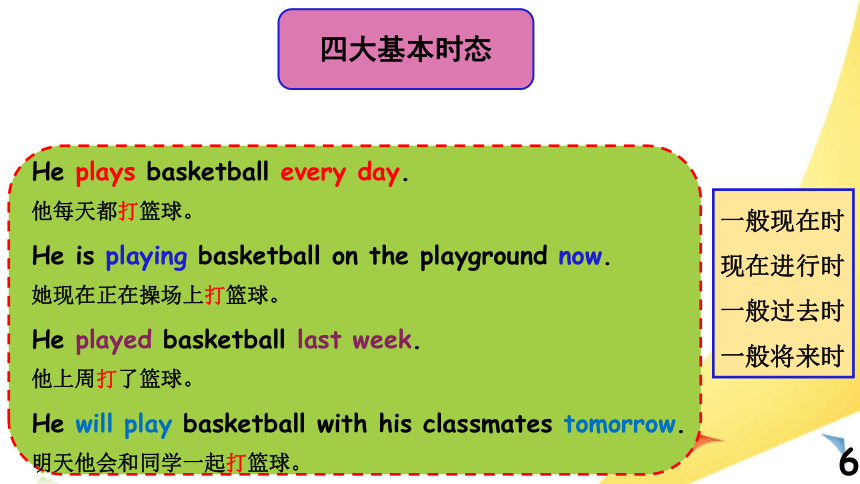
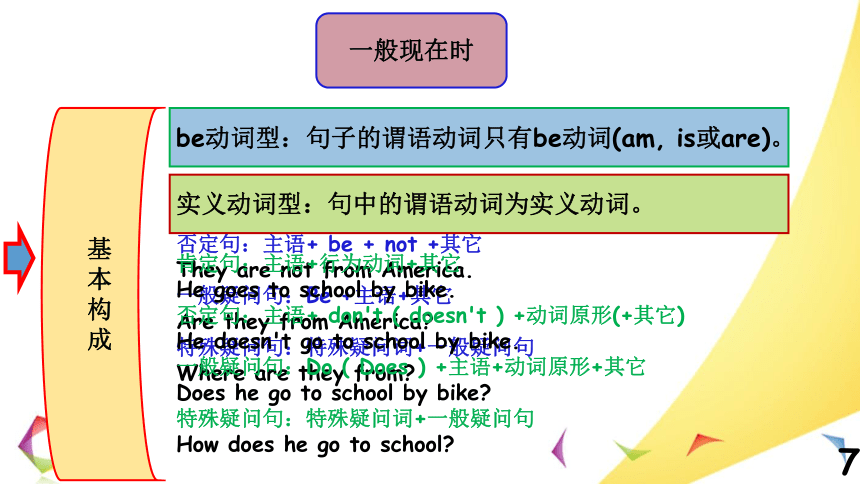
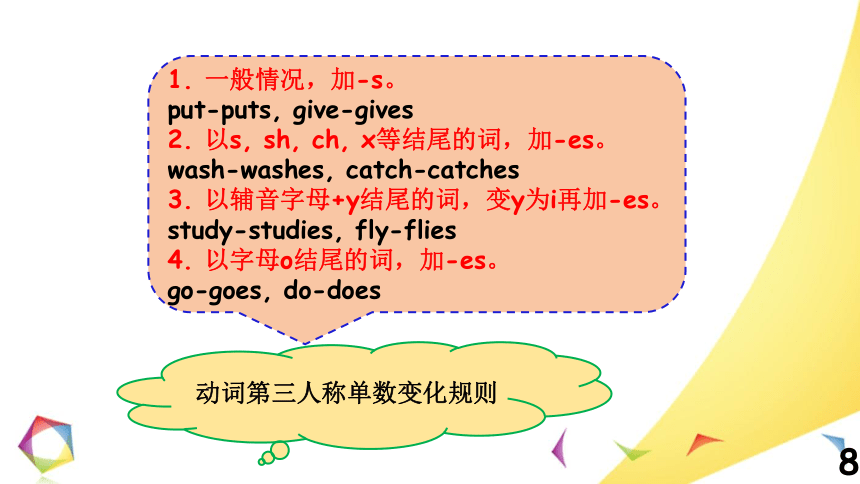
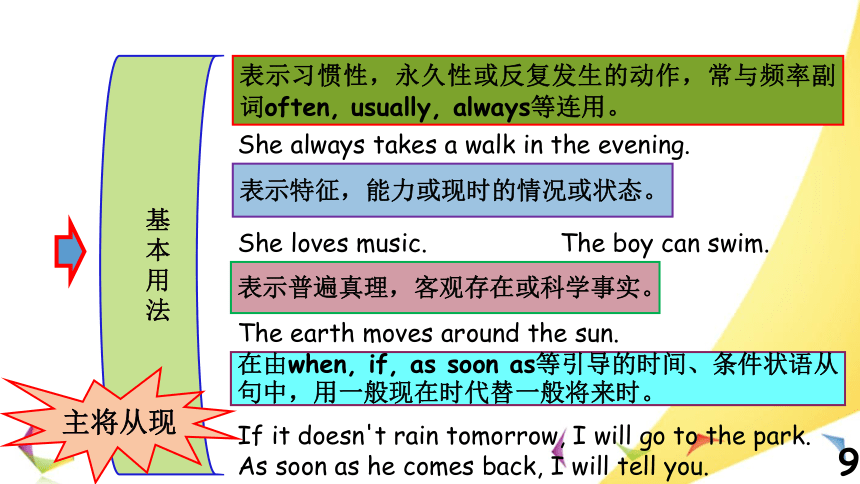
文档简介
(共21张PPT)
Lesson 7四大时态时态是什么时态时态就是动作发生的时间和动作本身的状态。英语中一共有多少种时态?时态的二分法现在将来过去过去将来现在时间范畴时态过去时间范畴时态现在时间范畴时态过去时间范畴时态一般现在时现在进行时一般将来时现在完成时一般过去时过去进行时过去将来时过去完成时Heplaysbasketballevery day.他每天都打篮球。He isplayingbasketball on the playgroundnow.她现在正在操场上打篮球。Heplayedbasketballlast week.他上周打了篮球。Hewill playbasketball with his classmatestomorrow.明天他会和同学一起打篮球。四大基本时态一般现在时现在进行时一般过去时一般将来时一般现在时基本构成be动词型:句子的谓语动词只有be动词(am,is或are)。肯定句:主语+be (am, is, are)+其它They are from America.否定句:主语+ be + not +其它They are not from America.一般疑问句:Be +主语+其它Are they from America 特殊疑问句:特殊疑问词+一般疑问句Where are they from 实义动词型:句中的谓语动词为实义动词。肯定句:主语+行为动词+其它He goes to school by bike.否定句:主语+ don't ( doesn't ) +动词原形(+其它)He doesn't go to school by bike.一般疑问句:Do ( Does ) +主语+动词原形+其它Does he go to school by bike 特殊疑问句:特殊疑问词+一般疑问句How does he go to school 1. 一般情况,加-s。put-puts, give-gives2. 以s, sh, ch, x等结尾的词,加-es。wash-washes, catch-catches3. 以辅音字母+y结尾的词,变y为i再加-es。study-studies, fly-flies4. 以字母o结尾的词,加-es。go-goes, do-does动词第三人称单数变化规则基本用法表示习惯性,永久性或反复发生的动作,常与频率副词often, usually, always等连用。She always takes a walk in the evening.表示特征,能力或现时的情况或状态。She loves music.The boycan swim.表示普遍真理,客观存在或科学事实。The earth moves around the sun.在由when, if, as soon as等引导的时间、条件状语从句中,用一般现在时代替一般将来时。If it doesn't rain tomorrow, I will go to the park.As soon as he comes back, I will tell you.主将从现现在进行时基本构成am/is/are+动词的现在分词+其它成分。否定句:主语+am/is/are+not+动词的现在分词+其它成分They are not sleeping in the bedroom.一般疑问句:am/is/are+主语+动词的现在分词+其它成分Are they swimming in the bedroom 特殊疑问句:特殊疑问词+am/is/are+主语+动词的现在分词+其它成分Where are they swimming 1.一般情况下,直接在动词词尾加-ing。play→playinglook→lookingbring→bringing2.以辅音字母加e结尾的动词,需要去掉e,再加ing。take→takinghave→havinghate→hating3.以重读闭音节结尾,末尾只有一个辅音字母的动词,要双写这个辅音字母,再加-ing。put→puttingstop→stoppingbegin→beginning4.以ie结尾的词,改ie为y,再加-ing。lie→lyingdie→dying动词现在分词变化规则基本用法表示现在正在进行的动作,常与now, at the moment, look, listen等连用。It is raining heavily outside now.Listen, the girl is singing in the next room.用现在进行时表示将来,常用这种结构的动词有go, come, leave, stay等位移性动词,表示即将发生或安排好要做的事情。We are leaving for Shanghai.The bus is coming soon.一般过去时基本构成be动词型:句子的谓语动词只有be动词(was或were)。肯定句:主语+be (was, were)+其它He was in the room.否定句:主语+ be + not +其它He was not in the room.一般疑问句:Be +主语+其它Was he in the room 特殊疑问句:特殊疑问词+一般疑问句Where was he 实义动词型:句中的谓语动词为实义动词。肯定句:主语+行为动词+其它He left Beijing yesterday.否定句:主语+ didn't +动词原形(+其它)He didn't leave Beijing yesterday.一般疑问句:Did+主语+动词原形+其它Did he leave Beijing yesterday 特殊疑问句:特殊疑问词+一般疑问句When did he leave Beijing 1.一般情况下,在动词原形后面加-ed。look→lookedplay→played2.以不发音e结尾的动词,在词尾直接加-d。live→liveduse→used3.以“辅音字母+ y”结尾的动词,先将y改为i ,再加–ed。study→studiedtry→tried4.以重读闭音节(即辅音字母+元音字母+辅音字母),末尾只有一个辅音字母的动词,要先双写这个辅音字母后,再加–ed。stop→stoppedplan→planned动词过去式规则变化基本用法表示过去发生的而现在已经结束的事情、动作或情况,常和明确的过去时间状语连用,如:yesterday, last week, three days ago等。My brother got married last week.表示过去的习惯性动作或状态,句中常带有every day, often, usually, always, sometimes 等状语。When she was in that city, she often went to the Central Supermarket.一般将来时基本构成shall/will+动词原形 (shall用于第一人称,will可用于所有人称)I shall buy a new desk.Shall we have take a walk after dinner They will not tell the secret to others.be(am, is, are)going to+动词原形It is going to rain.Are you going to see a film 基本用法表示将来要发生的动作或存在的状态。I shall be late home tonight.表示有计划或安排将来要去做的事。I'm going to see you after work.will/shall+dobe going to+doVS表示说话人的愿望或想法表示必然性,注定要发生的事情没有经过事前考虑的意图表示打算、计划将要做的事情客观迹象表明将要发生的事情事前考虑过的意图I think China will become stronger and stronger.Fish will die out of water.Our school is going to hold the sports meeting next week.Her face becomes red. She is going to get better.—Why do you put off all the pictures —I am going to repaint the wall.—The box is too heavy to carry.—Oh, I will help you.沙场大点兵1. He_____at six every day.A. get up B. gets up C. got upD. is getting up2. What did you see ________ A. now B. every day C. just nowD. three days3. He went into the room and________ the door.A. lock B. locking C. locks D. locked4. ---What________ you ________ last week --- I bought a bag.A. did ,buy B. did , bought C. do, buy D. do, bought5. ---________ he________ his lunch --- Yes, he did.A. Does ,had B. Does, have C. Did, have D. Did, had6.They________books every day in the library.A. reads B. readC. reading D. readed7. I like watching TV, but my mother________ like it.A. don‘t B. doesn’tC. does D. didn‘t8. ________ your father drink milk every day A. Do B. AreC. Does D. is9. We will go shopping if it________ tomorrow.A. don’t rain B. didn’t rainC. doesn‘t rain D. isn‘t rain10. ---When________he get home on Friday ---He gets home at four on Friday.A. do B. does C. did D. is
Lesson 7四大时态时态是什么时态时态就是动作发生的时间和动作本身的状态。英语中一共有多少种时态?时态的二分法现在将来过去过去将来现在时间范畴时态过去时间范畴时态现在时间范畴时态过去时间范畴时态一般现在时现在进行时一般将来时现在完成时一般过去时过去进行时过去将来时过去完成时Heplaysbasketballevery day.他每天都打篮球。He isplayingbasketball on the playgroundnow.她现在正在操场上打篮球。Heplayedbasketballlast week.他上周打了篮球。Hewill playbasketball with his classmatestomorrow.明天他会和同学一起打篮球。四大基本时态一般现在时现在进行时一般过去时一般将来时一般现在时基本构成be动词型:句子的谓语动词只有be动词(am,is或are)。肯定句:主语+be (am, is, are)+其它They are from America.否定句:主语+ be + not +其它They are not from America.一般疑问句:Be +主语+其它Are they from America 特殊疑问句:特殊疑问词+一般疑问句Where are they from 实义动词型:句中的谓语动词为实义动词。肯定句:主语+行为动词+其它He goes to school by bike.否定句:主语+ don't ( doesn't ) +动词原形(+其它)He doesn't go to school by bike.一般疑问句:Do ( Does ) +主语+动词原形+其它Does he go to school by bike 特殊疑问句:特殊疑问词+一般疑问句How does he go to school 1. 一般情况,加-s。put-puts, give-gives2. 以s, sh, ch, x等结尾的词,加-es。wash-washes, catch-catches3. 以辅音字母+y结尾的词,变y为i再加-es。study-studies, fly-flies4. 以字母o结尾的词,加-es。go-goes, do-does动词第三人称单数变化规则基本用法表示习惯性,永久性或反复发生的动作,常与频率副词often, usually, always等连用。She always takes a walk in the evening.表示特征,能力或现时的情况或状态。She loves music.The boycan swim.表示普遍真理,客观存在或科学事实。The earth moves around the sun.在由when, if, as soon as等引导的时间、条件状语从句中,用一般现在时代替一般将来时。If it doesn't rain tomorrow, I will go to the park.As soon as he comes back, I will tell you.主将从现现在进行时基本构成am/is/are+动词的现在分词+其它成分。否定句:主语+am/is/are+not+动词的现在分词+其它成分They are not sleeping in the bedroom.一般疑问句:am/is/are+主语+动词的现在分词+其它成分Are they swimming in the bedroom 特殊疑问句:特殊疑问词+am/is/are+主语+动词的现在分词+其它成分Where are they swimming 1.一般情况下,直接在动词词尾加-ing。play→playinglook→lookingbring→bringing2.以辅音字母加e结尾的动词,需要去掉e,再加ing。take→takinghave→havinghate→hating3.以重读闭音节结尾,末尾只有一个辅音字母的动词,要双写这个辅音字母,再加-ing。put→puttingstop→stoppingbegin→beginning4.以ie结尾的词,改ie为y,再加-ing。lie→lyingdie→dying动词现在分词变化规则基本用法表示现在正在进行的动作,常与now, at the moment, look, listen等连用。It is raining heavily outside now.Listen, the girl is singing in the next room.用现在进行时表示将来,常用这种结构的动词有go, come, leave, stay等位移性动词,表示即将发生或安排好要做的事情。We are leaving for Shanghai.The bus is coming soon.一般过去时基本构成be动词型:句子的谓语动词只有be动词(was或were)。肯定句:主语+be (was, were)+其它He was in the room.否定句:主语+ be + not +其它He was not in the room.一般疑问句:Be +主语+其它Was he in the room 特殊疑问句:特殊疑问词+一般疑问句Where was he 实义动词型:句中的谓语动词为实义动词。肯定句:主语+行为动词+其它He left Beijing yesterday.否定句:主语+ didn't +动词原形(+其它)He didn't leave Beijing yesterday.一般疑问句:Did+主语+动词原形+其它Did he leave Beijing yesterday 特殊疑问句:特殊疑问词+一般疑问句When did he leave Beijing 1.一般情况下,在动词原形后面加-ed。look→lookedplay→played2.以不发音e结尾的动词,在词尾直接加-d。live→liveduse→used3.以“辅音字母+ y”结尾的动词,先将y改为i ,再加–ed。study→studiedtry→tried4.以重读闭音节(即辅音字母+元音字母+辅音字母),末尾只有一个辅音字母的动词,要先双写这个辅音字母后,再加–ed。stop→stoppedplan→planned动词过去式规则变化基本用法表示过去发生的而现在已经结束的事情、动作或情况,常和明确的过去时间状语连用,如:yesterday, last week, three days ago等。My brother got married last week.表示过去的习惯性动作或状态,句中常带有every day, often, usually, always, sometimes 等状语。When she was in that city, she often went to the Central Supermarket.一般将来时基本构成shall/will+动词原形 (shall用于第一人称,will可用于所有人称)I shall buy a new desk.Shall we have take a walk after dinner They will not tell the secret to others.be(am, is, are)going to+动词原形It is going to rain.Are you going to see a film 基本用法表示将来要发生的动作或存在的状态。I shall be late home tonight.表示有计划或安排将来要去做的事。I'm going to see you after work.will/shall+dobe going to+doVS表示说话人的愿望或想法表示必然性,注定要发生的事情没有经过事前考虑的意图表示打算、计划将要做的事情客观迹象表明将要发生的事情事前考虑过的意图I think China will become stronger and stronger.Fish will die out of water.Our school is going to hold the sports meeting next week.Her face becomes red. She is going to get better.—Why do you put off all the pictures —I am going to repaint the wall.—The box is too heavy to carry.—Oh, I will help you.沙场大点兵1. He_____at six every day.A. get up B. gets up C. got upD. is getting up2. What did you see ________ A. now B. every day C. just nowD. three days3. He went into the room and________ the door.A. lock B. locking C. locks D. locked4. ---What________ you ________ last week --- I bought a bag.A. did ,buy B. did , bought C. do, buy D. do, bought5. ---________ he________ his lunch --- Yes, he did.A. Does ,had B. Does, have C. Did, have D. Did, had6.They________books every day in the library.A. reads B. readC. reading D. readed7. I like watching TV, but my mother________ like it.A. don‘t B. doesn’tC. does D. didn‘t8. ________ your father drink milk every day A. Do B. AreC. Does D. is9. We will go shopping if it________ tomorrow.A. don’t rain B. didn’t rainC. doesn‘t rain D. isn‘t rain10. ---When________he get home on Friday ---He gets home at four on Friday.A. do B. does C. did D. is
同课章节目录
- 词法
- 名词
- 动词和动词短语
- 动词语态
- 动词时态
- 助动词和情态动词
- 非谓语动词
- 冠词
- 代词
- 数词和量词
- 形容词副词及其比较等级
- 介词和介词短语
- 连词和感叹词
- 构词法
- 相似、相近词比较
- 句法
- 陈述句
- 一般疑问句和否定疑问句
- 特殊疑问句及选择疑问句
- 反意疑问句
- 存在句(There be句型)
- 宾语从句
- 定语从句
- 状语从句
- 主谓一致问题
- 简单句
- 并列句
- 复合句
- 主谓一致
- 主、表语从句
- 名词性从句
- 直接引语和间接引语
- 虚拟语气
- 感叹句
- 强调句
- 倒装句
- 祈使句
- 句子的成分
- 句子的分类
- 题型专区
- 单项选择部分
- 易错题
- 完形填空
- 阅读理解
- 词汇练习
- 听说训练
- 句型转换
- 补全对话
- 短文改错
- 翻译
- 书面表达
- 任务型阅读
- 语法填空
- 其他资料
